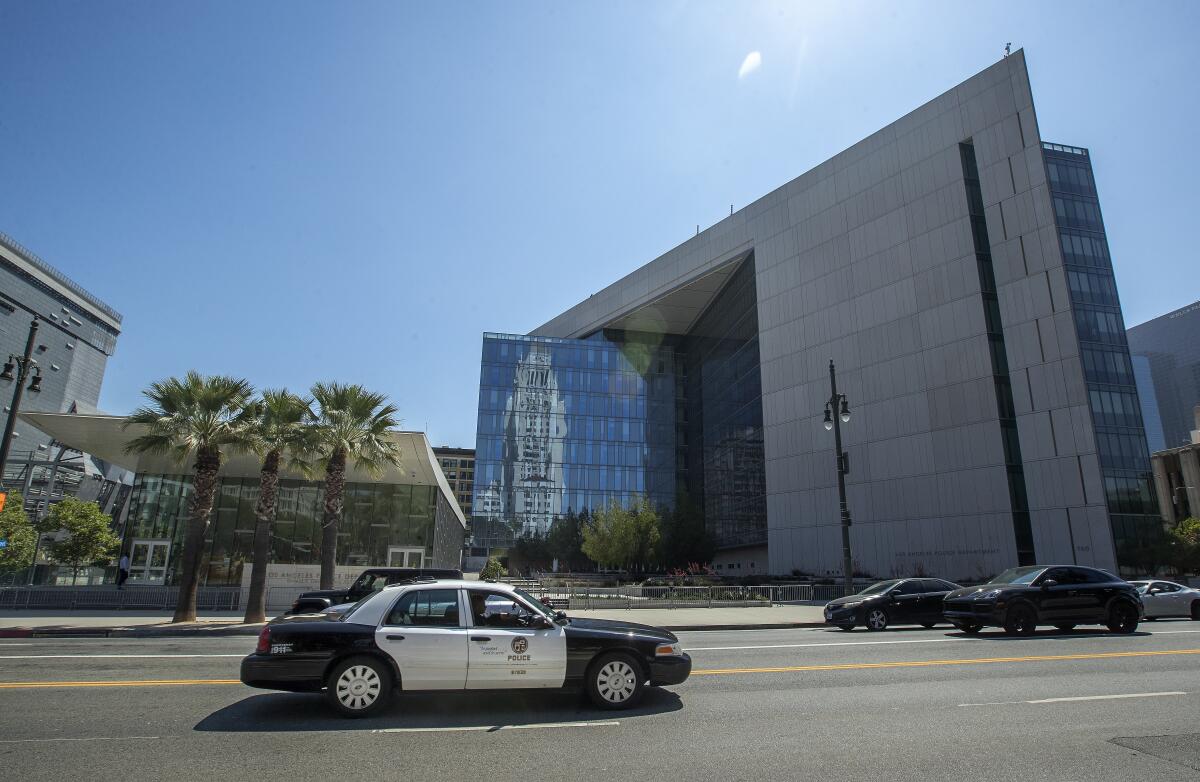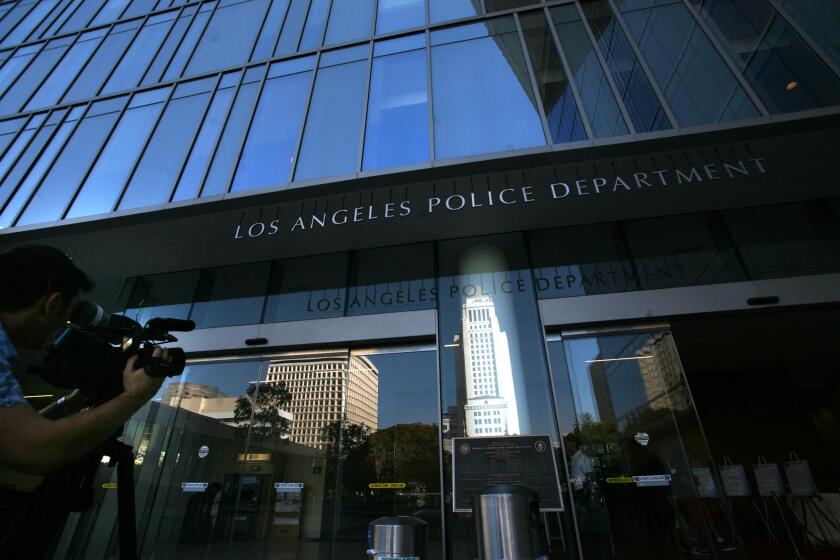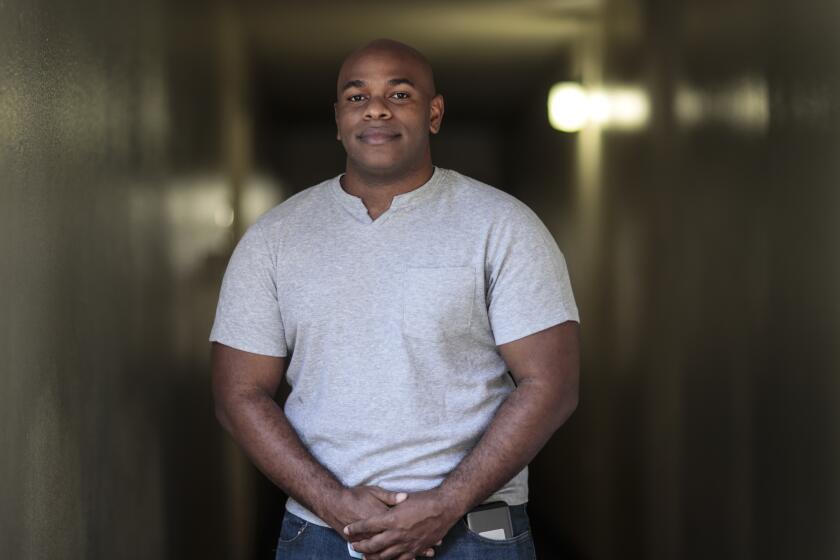L.A. Police Commission appoints new president, who promptly rejects ‘defund’ movement

- Share via
After being appointed president of the Los Angeles Police Department’s civilian oversight panel on Tuesday, attorney William Briggs promptly rejected the notion that the LAPD should be “defunded,” arguing instead that it needs more sworn officers to keep the city safe.
“Our communities of color that are most impacted by crime, many of which have seen the homicide rate rise above 30% this year, cannot afford to go without law enforcement,” Briggs said in prepared remarks, which he delivered after unanimous appointment by his Police Commission colleagues.
Briggs, who is Black and a partner at the law firm Venable, was nominated to the commission by Mayor Eric Garcetti in November, joined the panel in December and had been serving as its vice president before Tuesday’s vote.
He takes over for Eileen Decker, a former federal prosecutor who was term-limited as the panel’s president. Decker will remain on the commission as vice president, swapping roles with Briggs.
Although the Police Commission does not directly control the LAPD’s budget or staffing levels, it does set policy and approve certain spending. It also wields significant sway over LAPD brass, as its members approve the appointment of the chief.
Los Angeles Mayor Eric Garcetti has nominated attorney William Briggs to replace nonprofit executive Shane Murphy Goldsmith on the city’s five-member Police Commission, his office said Tuesday.
Briggs’ swift dismissal of the “defund the police” movement comes as homicides and shootings have surged in the city to levels not seen in a decade and as the LAPD tries to rebound after losing hundreds of officers — dropping from more than 10,000 sworn cops to fewer than 9,500 because of a hiring freeze spurred by the COVID-19 pandemic and its financial toll on city coffers.
Briggs’ comments also come after a year of mass protests and calls from activists for the LAPD’s significant budget to be slashed and reallocated to social service providers and mental health clinicians, who the activists believe would be better suited to handle an increasing number of calls involving people who are mentally ill, homeless or addicted to drugs.
Those activists routinely call into the commission’s weekly meetings to demand the LAPD be defunded and to directly criticize the commission’s members, who they argue are apologists for the department rather than legitimate overseers.
In the past, Decker and other commissioners have made it a point of telling the activists that their voices were being heard, even if their policy prescriptions were going unheeded. But on Tuesday, Briggs showed zero intention of bowing to such pressure or appeasing the activists.
“Let me be perfectly clear where I stand: I do not agree with the ‘defund the police’ notion,” Briggs said, with the words “do not” bolded in his prepared remarks.
Briggs said he agrees with city and community leaders that police “cannot and should not be the answer to every issue we face,” and said he supports expanding mental health evaluation units that pair officers with clinicians. But he also said he wants to see more “beat patrols” — or officers who work the same neighborhoods to get to know residents and build trust — and more officers in the LAPD’s Community Safety Partnership Bureau.
“I intend to be a tireless advocate for the expansion of this type of policing because I believe it helps to establish bonds of cooperation, trust and confidence in each other,” Briggs said.
Referencing a recent Times article profiling a young Black police officer and the challenges he has faced in the last year — including taunts from community members and misunderstanding and racism among peers — Briggs said he would also “work tirelessly” to address those issues and increase the ranks of Black and female officers.
LAPD Officer Michael Silva says he has been left with a feeling of “being in between” this year — commiserating with protesters and his fellow officers, and being judged by both.
Briggs noted the LAPD is smaller in number than the police forces of other large cities in the country, and called that “unacceptable” — particularly with the city preparing to host major events such as the Olympics in 2028 and potential World Cup matches in 2026.
“While it may not be within the purview of the commission to set the overall number of sworn officers in the LAPD, we can certainly advocate to those stakeholders whose primary job it is to keep our citizens safe to ensure that we have enough officers to do the job,” Briggs said. “Based on my limited time on the commission, I am concerned that the department simply does not have sufficient personnel to do the job that the citizens of Los Angeles expect of it.”
Briggs’ comments drew immediate criticism from activists.
Hamid Khan of the Stop LAPD Spying Coalition, pointed to a recent survey that showed a sizable portion of residents support LAPD funding being redirected to other services, and said Briggs was “claiming to represent the will of the people but in practice outright rejecting what the people want.”
Khan said that past expansions of so-called community policing initiatives and the LAPD’s actions before the last Olympics in the city in 1984 led to “the displacement of communities, the criminalization of thousands of people” and severe racial profiling, and that nothing would be different if Briggs got the LAPD buildup he now envisions.
Paula Minor, who leads Black Lives Matter-Los Angeles’ police accountability team, said she suspected Briggs was chosen for the role by city power brokers — including the mayor and members of the City Council — who knew he would maintain staunch support for the LAPD despite growing opposition.
“Briggs will toe the line,” Minor said. “They’re not looking for any kind of change.”
More to Read
Sign up for Essential California
The most important California stories and recommendations in your inbox every morning.
You may occasionally receive promotional content from the Los Angeles Times.













